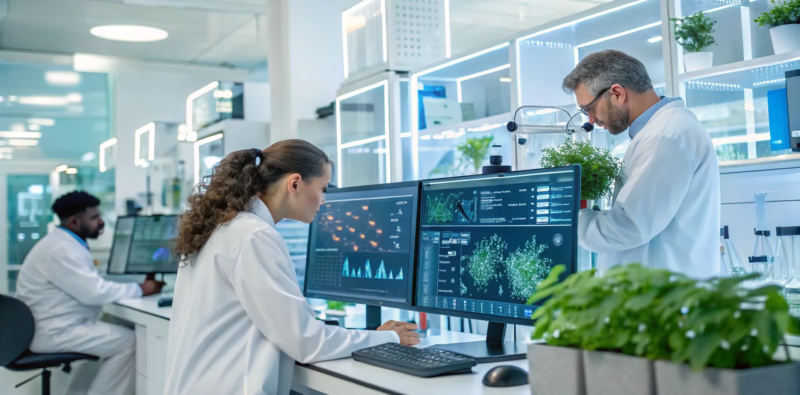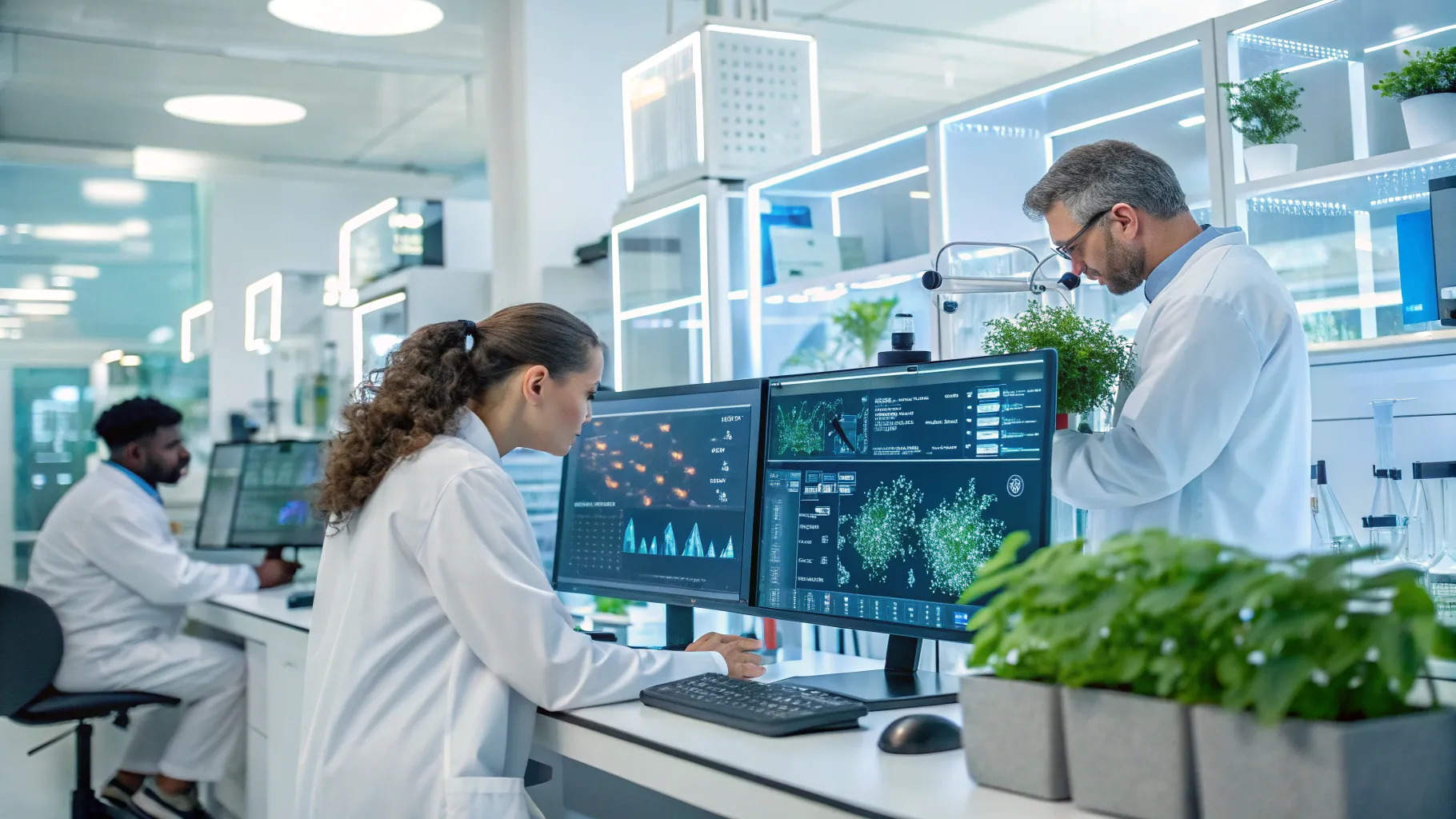
Unlocking Your Future: How AI and ML are Transforming Biotechnology Careers

As technology continues to advance, the integration of AI and machine learning in biotechnology is reshaping the landscape of careers in this field. This blog explores how aspiring biotechnologists can leverage these innovations to build a successful and impactful future.
Table of Contents
- 🌱 The Rise of AI in Biotechnology
- 💡 Understanding AI and ML: What You Need to Know
- 🔬 The Importance of Bioinformatics
- 🚀 Career Opportunities in AI and Biotechnology
- 🧬 Real-World Applications: Cancer Diagnosis
- 📚 Training Programs: Your Pathway to Success
- 🔍 The Role of Research in Biotechnology
- 🤝 The Impact of Industry Partnerships
- 🛤️ Your Journey: From Learning to Placement
- 🌐 Engaging with the Community: Stay Connected
- ❓ Frequently Asked Questions
🌱 The Rise of AI in Biotechnology
Artificial Intelligence (AI) is not just a buzzword; it’s a transformative force in biotechnology. As we look to the future, AI is changing how we conduct research, analyze data, and even develop drugs. The integration of AI in biotechnology is paving the way for innovative solutions that were once thought to be impossible.
One of the most significant impacts of AI is its ability to process vast amounts of data quickly. In biotechnology, this means analyzing genetic information, understanding complex biological systems, and predicting outcomes more accurately than ever before. This capability can lead to breakthroughs in areas like drug discovery and personalized medicine.
Moreover, AI enables researchers to identify patterns that humans may overlook. For instance, in the realm of genomics, AI can help identify mutations linked to specific diseases, allowing for targeted treatments. This not only enhances the efficiency of research but also accelerates the development of life-saving therapies.
Why is AI Essential in Biotechnology?
- Data Analysis: AI algorithms can analyze large datasets, making sense of complex biological data.
- Predictive Modeling: AI can predict how biological systems will respond to various treatments.
- Automation: AI can automate repetitive tasks, freeing researchers to focus on more innovative aspects of their work.
- Personalized Medicine: AI helps tailor medical treatments to individual patients based on their genetic makeup.
💡 Understanding AI and ML: What You Need to Know
Before diving into careers in AI and biotechnology, it’s essential to grasp the basic concepts of Artificial Intelligence (AI) and Machine Learning (ML). AI refers to the simulation of human intelligence in machines, enabling them to perform tasks that typically require human intelligence. ML is a subset of AI that focuses on the development of algorithms that allow computers to learn from and make decisions based on data.
In biotechnology, AI and ML can analyze biological data, identify trends, and even predict disease outbreaks. This capability is crucial for researchers looking to innovate and improve healthcare solutions. Understanding these technologies is fundamental for anyone aspiring to work in this exciting field.
Key Concepts of AI and ML
- Algorithms: These are sets of rules or instructions given to an AI system to help it learn on its own.
- Neural Networks: A type of AI modeled after the human brain, used to recognize patterns and make decisions.
- Data Training: The process of teaching an AI model using large datasets to improve its accuracy.
- Supervised Learning: A type of machine learning where the model is trained on labeled data.
🔬 The Importance of Bioinformatics
Bioinformatics is a critical intersection of biology and technology. It involves the use of software and algorithms to understand biological data, particularly in genomics and proteomics. As biotechnology evolves, the role of bioinformatics becomes increasingly vital.
Bioinformatics tools allow scientists to manage and analyze the massive amounts of data generated by modern experiments. This capability is essential for making sense of complex biological information and translating it into actionable insights.
Why Bioinformatics Matters
- Data Management: Helps organize and interpret vast datasets generated by biological research.
- Research Efficiency: Streamlines the research process, allowing scientists to focus on hypothesis testing and discovery.
- Collaboration: Facilitates collaboration among researchers by providing standardized data formats and tools.
- Future Innovations: Drives advancements in personalized medicine and targeted therapies.
🚀 Career Opportunities in AI and Biotechnology
The integration of AI in biotechnology has opened a wide array of career opportunities. Students interested in this field can explore various roles that combine their passion for life sciences and technology.
From research positions to data science roles, the possibilities are endless. Here are some exciting career paths you might consider:
Potential Career Paths
- Data Scientist: Analyze biological data to derive meaningful insights.
- Bioinformatics Specialist: Develop tools and algorithms to process biological data.
- Research Scientist: Conduct experiments to explore new therapies and technologies.
- Regulatory Affairs Specialist: Ensure that new products comply with regulations.
- Clinical Data Manager: Oversee clinical trial data to ensure accuracy and compliance.
🧬 Real-World Applications: Cancer Diagnosis
Cancer remains one of the most challenging diseases to diagnose and treat. However, AI is revolutionizing how we approach cancer diagnosis. By analyzing medical images and patient data, AI can help identify signs of cancer earlier than traditional methods.
For example, AI algorithms can analyze mammograms with high accuracy, detecting tumors that might be missed by the human eye. This early detection can significantly improve treatment outcomes and save lives.
Furthermore, AI can assist in developing personalized treatment plans based on a patient’s genetic profile, leading to more effective therapies tailored to individual needs.
How AI is Changing Cancer Diagnosis
- Image Analysis: AI tools can analyze X-rays and MRIs to detect abnormalities.
- Predictive Analytics: AI can predict the likelihood of cancer recurrence based on patient data.
- Genomic Analysis: AI helps identify mutations and genetic markers linked to cancer.
- Clinical Decision Support: AI systems provide recommendations to doctors based on the latest research and patient data.
📚 Training Programs: Your Pathway to Success
To thrive in the AI and biotechnology sectors, students must pursue relevant training programs. These programs equip you with the necessary skills and knowledge to excel in your career. Look for courses that cover AI, ML, bioinformatics, and data analysis.
Many institutions now offer specialized training that combines theoretical knowledge with practical experience. This hands-on approach is invaluable in preparing you for real-world challenges.
What to Look for in a Training Program
- Curriculum: Ensure the program covers essential topics in AI, ML, and biotechnology.
- Industry Connections: Look for programs that offer internships or job placement assistance.
- Practical Experience: Choose programs that provide hands-on training through projects and labs.
- Expert Faculty: Learn from industry experts who can provide insights and mentorship.
🔍 The Role of Research in Biotechnology
Research is the backbone of biotechnology. It drives innovation and helps us understand complex biological processes. For students interested in biotechnology, engaging in research can open doors to exciting career opportunities.
At its core, research in biotechnology involves studying living organisms and their systems. This can lead to breakthroughs in medicine, agriculture, and environmental science. By participating in research projects, students not only gain valuable skills but also contribute to advancements that can change lives.
Why Research is Important
- Innovation: Research leads to new discoveries that can improve health and well-being.
- Skill Development: Conducting research helps students develop critical thinking and problem-solving skills.
- Networking: Working on research projects allows students to connect with professionals in the field.
- Career Opportunities: Research experience can enhance your resume and make you more attractive to employers.
🤝 The Impact of Industry Partnerships
Industry partnerships play a crucial role in the biotechnology sector. Collaborations between educational institutions and biotech companies lead to practical training and exposure to real-world challenges.
These partnerships provide students with opportunities to work on cutting-edge projects, gain hands-on experience, and understand industry needs. This experience is invaluable for building a successful career in biotechnology.
Benefits of Industry Partnerships
- Real-World Experience: Students gain insights into how the industry operates.
- Internship Opportunities: Many partnerships offer internships that can lead to full-time positions.
- Access to Resources: Students can benefit from advanced technologies and research facilities.
- Mentorship: Industry professionals can provide guidance and support to aspiring biotechnologists.
🛤️ Your Journey: From Learning to Placement
The journey from education to employment in biotechnology is exciting yet challenging. Here are the key steps you can take to ensure a smooth transition:
Steps to Successful Placement
- Build a Strong Foundation: Focus on your studies and gain a solid understanding of biotechnology principles.
- Engage in Internships: Seek internships during your studies to gain practical experience.
- Participate in Research: Involve yourself in research projects to enhance your skills and knowledge.
- Network: Attend industry events, workshops, and seminars to connect with professionals.
- Prepare for Interviews: Practice common interview questions and understand the industry trends.
🌐 Engaging with the Community: Stay Connected
Staying connected with the biotechnology community is vital for career growth. Engaging with peers, mentors, and industry professionals can provide support and insights that are crucial for your development.
Joining professional organizations, attending conferences, and participating in online forums can help you stay updated on industry trends and opportunities. Building a strong network can also lead to job opportunities and collaborations.
Ways to Engage with the Community
- Join Professional Networks: Become a member of biotechnology associations and groups.
- Attend Workshops: Participate in workshops to learn new skills and meet professionals.
- Utilize Social Media: Follow industry leaders and organizations on platforms like LinkedIn.
- Volunteer: Get involved in community projects related to biotechnology.
❓ Frequently Asked Questions
As you explore a career in biotechnology, you may have many questions. Here are some common queries answered:
FAQs
- What qualifications do I need for a career in biotechnology?
A bachelor’s degree in biotechnology, biology, or a related field is typically required. Advanced degrees can enhance job prospects. - Are there job opportunities in biotechnology?
Yes, the biotechnology sector is growing, with many opportunities in research, development, and manufacturing. - How important is networking in biotechnology?
Networking is crucial. It can lead to internships, job opportunities, and collaborations. - What skills are essential for a biotechnology career?
Important skills include analytical thinking, problem-solving, communication, and technical proficiency in data analysis.
